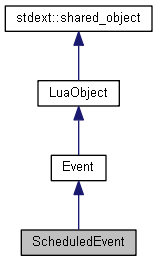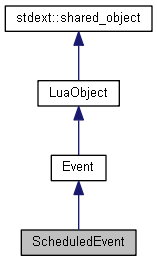|
| | ScheduledEvent (const std::function< void()> &callback, int delay, int maxCycles) |
| |
| void | execute () |
| |
| bool | nextCycle () |
| |
| int | ticks () |
| |
| int | remainingTicks () |
| |
| int | delay () |
| |
| int | cyclesExecuted () |
| |
| int | maxCycles () |
| |
| | Event (const std::function< void()> &callback) |
| |
| virtual | ~Event () |
| |
| void | cancel () |
| |
| bool | isCanceled () |
| |
| bool | isExecuted () |
| |
| | LuaObject () |
| |
| virtual | ~LuaObject () |
| |
| template<typename T > |
| void | connectLuaField (const std::string &field, const std::function< T > &f, bool pushFront=false) |
| |
| template<typename... T> |
| int | luaCallLuaField (const std::string &field, const T &... args) |
| |
| template<typename R , typename... T> |
| R | callLuaField (const std::string &field, const T &... args) |
| |
| template<typename... T> |
| void | callLuaField (const std::string &field, const T &... args) |
| |
| bool | hasLuaField (const std::string &field) |
| | Returns true if the lua field exists. More...
|
| |
| template<typename T > |
| void | setLuaField (const std::string &key, const T &value) |
| | Sets a field in this lua object. More...
|
| |
| template<typename T > |
| T | getLuaField (const std::string &key) |
| | Gets a field from this lua object. More...
|
| |
| void | releaseLuaFieldsTable () |
| | Release fields table reference. More...
|
| |
| void | luaSetField (const std::string &key) |
| | Sets a field from this lua object, the value must be on the stack. More...
|
| |
| void | luaGetField (const std::string &key) |
| | Gets a field from this lua object, the result is pushed onto the stack. More...
|
| |
| void | luaGetMetatable () |
| | Get object's metatable. More...
|
| |
| void | luaGetFieldsTable () |
| | Gets the table containing all stored fields of this lua object, the result is pushed onto the stack. More...
|
| |
| int | getUseCount () |
| |
| std::string | getClassName () |
| | Returns the derived class name, its the same name used in Lua. More...
|
| |
| LuaObjectPtr | asLuaObject () |
| |
| void | operator= (const LuaObject &) |
| |
| | shared_object () |
| |
| virtual | ~shared_object () |
| |
| void | add_ref () |
| |
| void | dec_ref () |
| |
| refcount_t | ref_count () |
| |
| template<typename T > |
| stdext::shared_object_ptr< T > | static_self_cast () |
| |
| template<typename T > |
| stdext::shared_object_ptr< T > | dynamic_self_cast () |
| |
| template<typename T > |
| stdext::shared_object_ptr< T > | const_self_cast () |
| |
Definition at line 30 of file scheduledevent.h.


 Public Member Functions inherited from Event
Public Member Functions inherited from Event Public Member Functions inherited from LuaObject
Public Member Functions inherited from LuaObject Public Member Functions inherited from stdext::shared_object
Public Member Functions inherited from stdext::shared_object Protected Attributes inherited from Event
Protected Attributes inherited from Event








